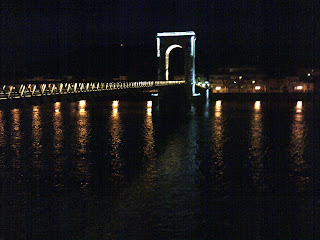Este fin de semana he conducido, junto a mis padres, los 1900 kilómetros que separan Guadalajara de Fráncfort. Hicimos escala por tercera vez en Tournon-sur-Rhône (ver foto adjunta), a la orilla del Ródano. En el viaje, atravesamos tres países (España, Francia y Alemania) y en cada uno de ellos hemos encontrado diferentes formas de conducir.
En España, más concretamente en la autopista que lleva a Madrid Barajas, vimos un pique entre dos coches (VW Golf y un Mercedes), con adelantamientos, frenazos y volantazos de todo tipo y condición. Sinceramente, este tipo de personas me dan asco, no puedo pensar de un comportamiento más repugnante que este, hay que ser muy tonto para hacer este tipo de cosas. En fin, por culpa de estos dos payasos sin gracia, los conductores españoles no quedamos muy bien parados, he de decir. Eso sí, en el nuevo tramo de la Nacional II cerca de Medinaceli, vimos un águila enorme cruzar volando immediatamente delante del coche: impresionante.
En Francia, la manera de conducir es diferente. Allí el carril izquierdo se utiliza únicamente para adelantar y uno regresa lo antes posible al carril derecho. Esto también supone que los coches no se lanzan al carril izquierdo a adelantar un camión hasta que están literalmente debajo del camión. Da igual que lo estén viendo 500 metros antes, uno solo se echa al carril izquierdo después de comprobar la parte trasera del camión en detalle y lo hace con un volantazo brusco y, si es posible, sin dar el intermitente.
Además, el límite de velocidad en Francia es de 130 km/h en autopistas y literalmente todos los coches van a esa velocidad. No es extraño ver un Citroen Saxo de hace quince años a 130 km/h como si tal cosa. También resulta curioso el comportamiento de los camiones, ya que llevan siempre una velocidad constante de 90 km/h. Y anda que no hay camiones en Lyon, se nota que es una ciudad industrial... En el caso de los coches, la velocidad es de 130 km/h en condiciones normales, 110 km/h con lluvia, 90 km/h en tramos con obra,...: hay mucha más variedad.

Por último, Alemania. No me gusta nada conducir en Alemania. En otras ocasiones, fue por la velocidad excesiva de los coches (no acabo de ver la gracia a eso de no poner límite de velocidad) y esta vez ha sido por el clima. Estaba lloviendo y el asfalto no absorbía nada de agua, con lo cual los coches y los camiones salpicaban el agua en todas las direcciones. Tener este tipo de asfalto en un país como Alemania, donde llueve a menudo, creo yo, me parece indigno. Otra cosa sería tenerlo en Almería, pero en Alemania... Luego, una vez pasada la lluvia, los 15 kilómetros rectos de la pista de Darmstadt merecen la pena solo por ver a coches en el carril izquierdo (de los cuatro que hay) a punto de despegar.
Veremos lo que nos depara la vuelta, donde estaremos conduciendo y haciendo turismo tres días por Francia.
 This is the last post in the blog that I will write from Frankfurt, the place where I have lived and worked (a lot) in the last three years. I have changed (hopefully for good) a lot. I have developed talents I did not know that I had and I have learnt to live in an amazing independent way in a foreign country (although sometimes, when I was sick, I was not feeling that good about it). But, having a wonderful time here, I have the feeling that this phase in my life is over and that there is high time for something new.
This is the last post in the blog that I will write from Frankfurt, the place where I have lived and worked (a lot) in the last three years. I have changed (hopefully for good) a lot. I have developed talents I did not know that I had and I have learnt to live in an amazing independent way in a foreign country (although sometimes, when I was sick, I was not feeling that good about it). But, having a wonderful time here, I have the feeling that this phase in my life is over and that there is high time for something new.




